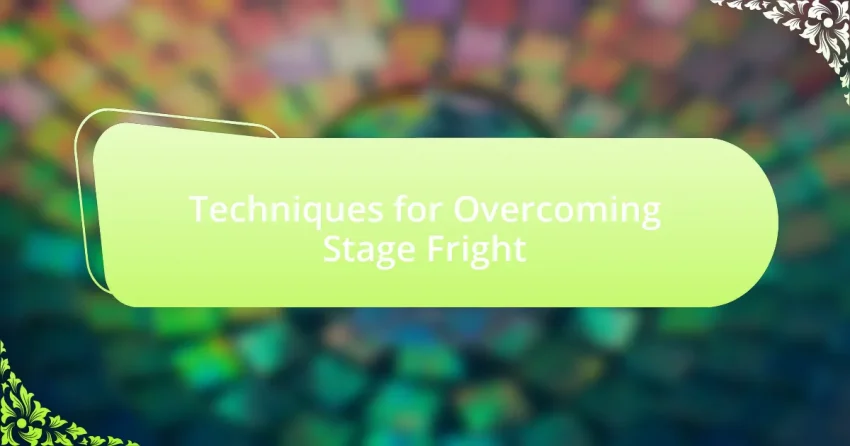Stage fright is a psychological condition marked by intense anxiety and fear experienced during public performances, affecting approximately 75% of individuals. This article explores the manifestations of stage fright, including physical symptoms like increased heart rate and sweating, as well as emotional responses such as fear of judgment and self-doubt. It examines the psychological factors contributing to stage fright, the impact of past experiences, and effective techniques for overcoming it, including preparation, practice, breathing exercises, and cognitive strategies. Additionally, the article highlights the importance of understanding the audience and creating a supportive environment to alleviate performance anxiety.

What is Stage Fright?
Stage fright is a psychological condition characterized by intense anxiety and fear experienced by individuals when performing in front of an audience. This phenomenon often leads to physical symptoms such as sweating, trembling, and increased heart rate, which can hinder performance. Research indicates that approximately 75% of people experience some form of stage fright, highlighting its prevalence. The fear typically stems from concerns about judgment, failure, or embarrassment in public settings.
How does stage fright manifest in individuals?
Stage fright manifests in individuals through a range of physical and psychological symptoms. Common physical symptoms include increased heart rate, sweating, trembling, dry mouth, and nausea, which can occur as a result of the body’s fight-or-flight response to perceived threats. Psychologically, individuals may experience anxiety, fear of judgment, and a sense of impending doom, leading to difficulty concentrating and negative self-talk. Research indicates that approximately 75% of people experience some form of anxiety related to public speaking, highlighting the prevalence of stage fright and its impact on performance.
What are the physical symptoms of stage fright?
The physical symptoms of stage fright include increased heart rate, sweating, trembling, dry mouth, and nausea. These symptoms arise from the body’s fight-or-flight response, which is triggered by anxiety in performance situations. Research indicates that approximately 75% of people experience some form of stage fright, highlighting its prevalence and the physiological reactions associated with it.
What are the emotional symptoms of stage fright?
The emotional symptoms of stage fright include intense anxiety, fear of judgment, and feelings of inadequacy. Individuals experiencing stage fright often report overwhelming nervousness, a sense of impending doom, and a heightened state of self-consciousness. Research indicates that these emotional responses can lead to avoidance behaviors, where individuals may shy away from public speaking or performance opportunities due to the distress associated with these feelings.
Why do people experience stage fright?
People experience stage fright due to a combination of psychological and physiological responses to perceived threats in social situations. This anxiety often stems from fear of negative evaluation, where individuals worry about being judged or criticized by an audience. Research indicates that approximately 75% of people experience some form of performance anxiety, highlighting its prevalence. The body’s fight-or-flight response triggers physical symptoms such as increased heart rate, sweating, and trembling, which can further exacerbate feelings of fear and self-doubt.
What psychological factors contribute to stage fright?
Psychological factors contributing to stage fright include fear of negative evaluation, performance anxiety, and lack of self-confidence. Fear of negative evaluation arises from the concern about how others perceive one’s performance, leading to heightened anxiety. Performance anxiety manifests as excessive worry about making mistakes or failing to meet expectations, which can trigger physiological responses such as increased heart rate and sweating. Lack of self-confidence further exacerbates these feelings, as individuals doubt their abilities and fear judgment. Research indicates that these factors are prevalent among performers, with studies showing that up to 75% of individuals experience some form of performance anxiety, highlighting the significant impact of these psychological elements on stage fright.
How does past experience influence stage fright?
Past experience significantly influences stage fright by shaping an individual’s perception of performance situations. Negative past experiences, such as a previous failure or embarrassing moment on stage, can lead to heightened anxiety and fear of similar outcomes in future performances. Research indicates that individuals who have faced criticism or poor reception in the past are more likely to experience increased levels of stage fright, as their memories of these events create a mental association between performing and negative consequences. Conversely, positive past experiences can reduce stage fright by building confidence and a sense of competence, making individuals feel more prepared and less anxious when facing an audience.

What Techniques Can Help Overcome Stage Fright?
Techniques that can help overcome stage fright include deep breathing exercises, visualization, and practice. Deep breathing helps calm the nervous system, reducing anxiety levels before a performance. Visualization involves imagining a successful performance, which can boost confidence and reduce fear. Regular practice in front of small audiences can desensitize individuals to the experience of performing, making it easier to manage anxiety. Research indicates that these techniques are effective; for instance, a study published in the Journal of Anxiety, Stress & Coping found that deep breathing and visualization significantly reduced anxiety in performers.
How can preparation reduce stage fright?
Preparation can significantly reduce stage fright by increasing confidence and familiarity with the material. When individuals thoroughly prepare, they become more knowledgeable about their content, which minimizes uncertainty and anxiety. Research indicates that performers who practice extensively report lower levels of anxiety and higher performance quality, as preparation allows them to anticipate potential challenges and rehearse responses. For example, a study published in the Journal of Anxiety, Stress, & Coping found that individuals who engaged in systematic preparation techniques experienced a notable decrease in performance anxiety. Thus, effective preparation equips individuals with the skills and confidence needed to manage stage fright.
What role does practice play in overcoming stage fright?
Practice plays a crucial role in overcoming stage fright by enhancing familiarity and confidence in performance situations. Engaging in regular practice allows individuals to become more comfortable with their material, reducing anxiety associated with public speaking or performing. Research indicates that repeated exposure to performance scenarios through practice can desensitize individuals to the fear response, leading to improved emotional regulation and a greater sense of control. For instance, a study published in the Journal of Anxiety, Stress, & Coping found that performers who practiced consistently reported lower levels of anxiety and higher self-efficacy compared to those who did not. This evidence supports the assertion that practice is essential for mitigating stage fright.
How can understanding the audience help alleviate fear?
Understanding the audience can alleviate fear by enabling the speaker to tailor their message and approach to meet the audience’s expectations and needs. When speakers recognize the demographics, interests, and emotional states of their audience, they can create a more engaging and relatable presentation, which fosters a sense of connection. Research indicates that speakers who adapt their content based on audience analysis report lower anxiety levels and higher confidence, as they feel more prepared to address the specific concerns and interests of their listeners. This alignment reduces the perceived threat of judgment or rejection, ultimately diminishing fear associated with public speaking.
What mental strategies can be employed to combat stage fright?
Cognitive restructuring is a mental strategy that can effectively combat stage fright. This technique involves identifying and challenging negative thoughts related to performance, replacing them with positive affirmations. Research indicates that cognitive-behavioral therapy (CBT), which includes cognitive restructuring, has been shown to reduce anxiety in performers, as evidenced by a study published in the Journal of Anxiety, Stress, & Coping, where participants reported lower anxiety levels after engaging in CBT techniques. Additionally, visualization techniques, where performers mentally rehearse their success on stage, can enhance confidence and reduce fear, supported by findings in the Journal of Applied Sport Psychology that highlight the effectiveness of mental imagery in performance enhancement.
How does visualization help in managing stage fright?
Visualization helps in managing stage fright by allowing individuals to mentally rehearse their performance in a positive and controlled environment. This technique enables performers to create a vivid mental image of themselves succeeding on stage, which can reduce anxiety and build confidence. Research indicates that mental imagery can activate similar neural pathways as actual performance, enhancing familiarity and comfort with the situation. A study published in the Journal of Applied Sport Psychology found that athletes who practiced visualization experienced lower anxiety levels and improved performance outcomes, demonstrating its effectiveness in managing performance-related fears.
What are the benefits of positive self-talk?
Positive self-talk enhances confidence and reduces anxiety, particularly in high-pressure situations like public speaking. Research indicates that individuals who engage in positive self-talk experience lower levels of stress and improved performance. A study published in the Journal of Personality and Social Psychology found that self-affirmation through positive self-talk can lead to better coping strategies and increased resilience. This demonstrates that positive self-talk not only fosters a more optimistic mindset but also equips individuals with the mental tools necessary to manage stage fright effectively.

What Role Does Physical Preparation Play in Overcoming Stage Fright?
Physical preparation plays a crucial role in overcoming stage fright by enhancing confidence and reducing anxiety. Engaging in physical activities, such as deep breathing exercises, stretching, or even light cardio, can lower cortisol levels and promote relaxation, which directly counters the physiological symptoms of stage fright. Research indicates that physical activity increases endorphin levels, leading to improved mood and reduced stress, thereby equipping individuals to face performance situations with greater composure. Additionally, rehearsing physically in the actual performance space can familiarize the performer with the environment, further alleviating anxiety.
How can breathing techniques help manage anxiety?
Breathing techniques can effectively manage anxiety by promoting relaxation and reducing physiological symptoms associated with stress. These techniques, such as deep breathing and diaphragmatic breathing, activate the body’s parasympathetic nervous system, which counteracts the fight-or-flight response triggered by anxiety. Research indicates that controlled breathing can lower heart rate and blood pressure, leading to a calmer state of mind. A study published in the Journal of Clinical Psychology found that participants who practiced deep breathing reported a significant decrease in anxiety levels compared to those who did not engage in such techniques. This evidence supports the efficacy of breathing exercises as a practical tool for managing anxiety, particularly in high-pressure situations like public speaking.
What specific breathing exercises are effective for stage fright?
Diaphragmatic breathing, also known as abdominal or deep breathing, is an effective exercise for managing stage fright. This technique involves inhaling deeply through the nose, allowing the diaphragm to expand, and then exhaling slowly through the mouth. Research indicates that diaphragmatic breathing can reduce anxiety levels by activating the body’s relaxation response, which counteracts the physiological symptoms of stress, such as increased heart rate and shallow breathing. Additionally, box breathing, which consists of inhaling for four counts, holding for four counts, exhaling for four counts, and holding again for four counts, has been shown to enhance focus and calmness, making it beneficial for individuals facing performance anxiety.
How does posture influence confidence and anxiety levels?
Posture significantly influences confidence and anxiety levels by affecting both physiological and psychological states. Research indicates that adopting an open and upright posture can enhance feelings of confidence and reduce anxiety. For instance, a study by Carney et al. (2010) published in the journal Psychological Science found that individuals who engaged in “power posing”—standing tall with open body language—reported higher levels of confidence and lower cortisol levels, which are associated with stress. Conversely, slouched or closed postures can lead to increased feelings of anxiety and lower self-esteem, as they may signal to the brain a state of defeat or submission. Thus, maintaining a confident posture can serve as a practical technique for overcoming stage fright by promoting a more positive mental state.
What are some relaxation techniques to consider?
Some effective relaxation techniques to consider include deep breathing exercises, progressive muscle relaxation, and visualization. Deep breathing exercises involve inhaling deeply through the nose, holding the breath for a few seconds, and exhaling slowly through the mouth, which can reduce anxiety and promote calmness. Progressive muscle relaxation entails tensing and then relaxing each muscle group in the body, helping to alleviate physical tension associated with stress. Visualization involves imagining a peaceful scene or a successful performance, which can enhance confidence and reduce fear. These techniques are supported by research indicating that they can significantly lower stress levels and improve performance in high-pressure situations, such as public speaking.
How can mindfulness and meditation reduce stage fright?
Mindfulness and meditation can significantly reduce stage fright by promoting relaxation and enhancing focus. These practices help individuals become more aware of their thoughts and feelings, allowing them to manage anxiety effectively. Research indicates that mindfulness meditation can decrease physiological symptoms of anxiety, such as heart rate and blood pressure, which are often heightened during public speaking. A study published in the journal “Psychological Science” by Zeidan et al. (2010) found that just a few sessions of mindfulness meditation improved participants’ ability to concentrate and reduced stress levels. This enhanced state of awareness and calmness enables performers to approach their presentations with greater confidence and composure, ultimately mitigating the fear associated with stage fright.
What role does physical exercise play in managing anxiety?
Physical exercise plays a significant role in managing anxiety by reducing stress hormones and increasing endorphins, which are natural mood lifters. Engaging in regular physical activity has been shown to lower feelings of anxiety and improve overall mental well-being. Research indicates that aerobic exercise, such as running or cycling, can lead to a decrease in anxiety levels, with studies showing that individuals who exercise regularly report lower anxiety symptoms compared to those who do not. For instance, a study published in the Journal of Clinical Psychiatry found that participants who engaged in consistent physical activity experienced a notable reduction in anxiety symptoms, highlighting the effectiveness of exercise as a therapeutic intervention for anxiety management.
What are some practical tips for overcoming stage fright?
To overcome stage fright, individuals can practice deep breathing techniques, visualize success, and prepare thoroughly for their performance. Deep breathing helps calm the nervous system, reducing anxiety levels. Visualization involves imagining a successful performance, which can enhance confidence and reduce fear. Thorough preparation, including rehearsing multiple times, builds familiarity with the material, leading to increased comfort on stage. Research indicates that these techniques can significantly lower anxiety levels and improve performance outcomes, as evidenced by a study published in the Journal of Anxiety, Stress, & Coping, which found that cognitive-behavioral strategies effectively reduce performance anxiety.
How can one create a supportive environment before a performance?
To create a supportive environment before a performance, one should foster open communication and positive reinforcement among participants. Establishing a space where performers feel comfortable sharing their concerns and receiving encouragement can significantly reduce anxiety. Research indicates that social support is crucial in mitigating performance anxiety, as highlighted in a study by Bandura (1997) on self-efficacy, which emphasizes the importance of supportive interactions in enhancing confidence. Additionally, organizing pre-performance rituals, such as group warm-ups or motivational talks, can further strengthen camaraderie and create a sense of belonging, ultimately leading to improved performance outcomes.
What are the best practices for gradually facing fears related to public speaking?
The best practices for gradually facing fears related to public speaking include starting with small, low-stakes speaking opportunities, practicing regularly, and seeking constructive feedback. Individuals can begin by speaking in front of a mirror or recording themselves to build confidence. Gradually increasing the audience size, such as presenting to friends or family, helps desensitize the fear response. Research indicates that exposure therapy, which involves gradual exposure to the feared situation, effectively reduces anxiety (Hofmann et al., 2012, Cognitive Therapy and Research). Additionally, joining public speaking groups, such as Toastmasters, provides a supportive environment for practice and improvement.
